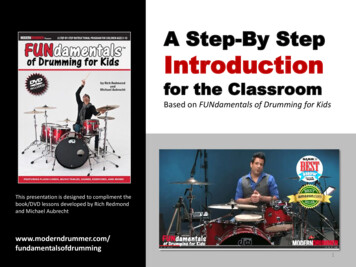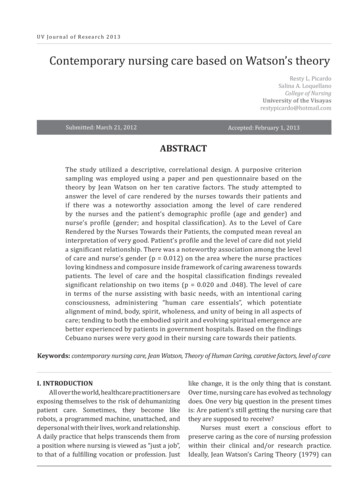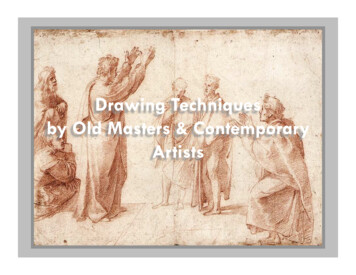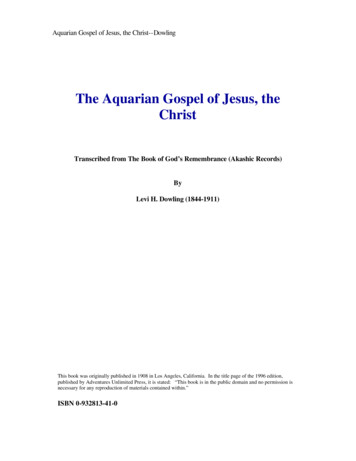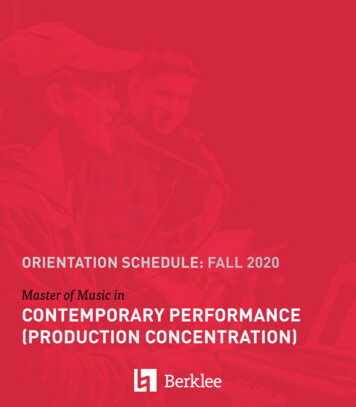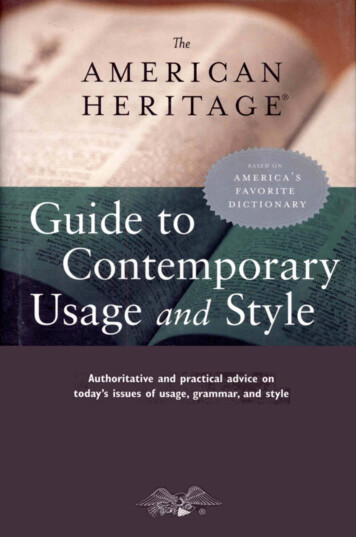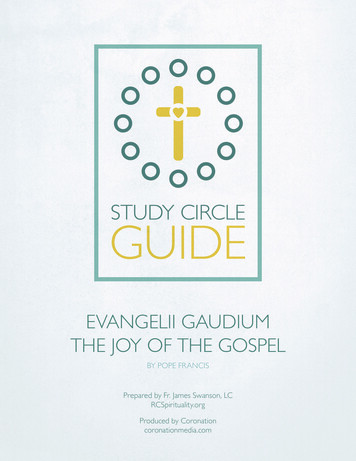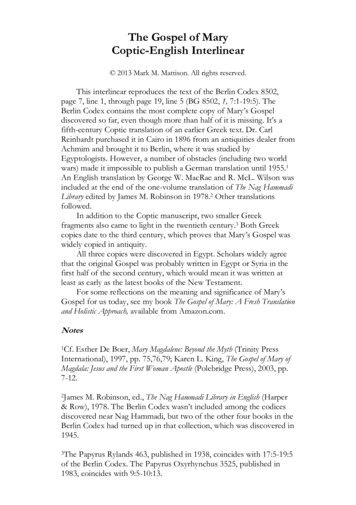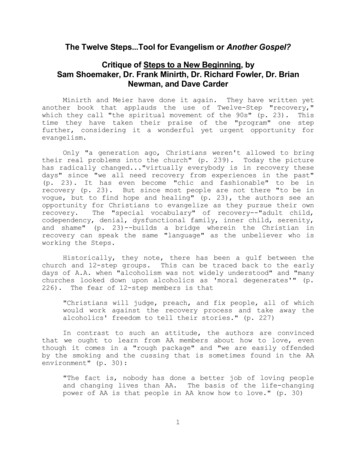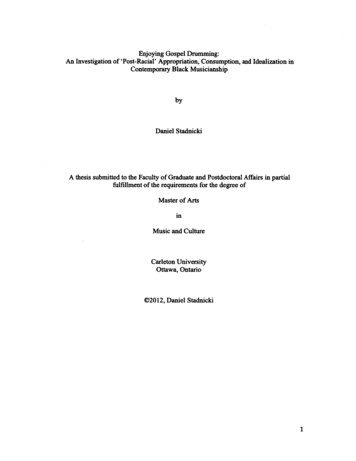
Transcription
Enjoying Gospel Drumming:An Investigation of ‘Post-Racial’ Appropriation, Consumption, and Idealization inContemporary Black MusicianshipbyDaniel StadnickiA thesis submitted to the Faculty of Graduate and Postdoctoral Affairs in partialfulfillment of the requirements for the degree ofMaster of ArtsinMusic and CultureCarleton UniversityOttawa, Ontario 2012, Daniel Stadnicki1
1 1Library and ArchivesCanadaBibliotheque etArchives CanadaPublished HeritageBranchDirection duPatrimoine de I'edition395 Wellington StreetOttawa ON K1A0N4Canada395, rue WellingtonOttawa ON K1A 0N4CanadaYour file Votre referenceISBN:978-0-494-93587-3Our file Notre referenceISBN:978-0-494-93587-3NOTICE:AVIS:The author has granted a non exclusive license allowing Library andArchives Canada to reproduce,publish, archive, preserve, conserve,communicate to the public bytelecommunication or on the Internet,loan, distrbute and sell thesesworldwide, for commercial or non commercial purposes, in microform,paper, electronic and/or any otherformats.L'auteur a accorde une licence non exclusivepermettant a la Bibliotheque et ArchivesCanada de reproduire, publier, archiver,sauvegarder, conserver, transmettre au publicpar telecommunication ou par I'lnternet, preter,distribuer et vendre des theses partout dans lemonde, a des fins commerciales ou autres, sursupport microforme, papier, electronique et/ouautres formats.The author retains copyrightownership and moral rights in thisthesis. Neither the thesis norsubstantial extracts from it may beprinted or otherwise reproducedwithout the author's permission.L'auteur conserve la propriete du droit d'auteuret des droits moraux qui protege cette these. Nila these ni des extraits substantiels de celle-cine doivent etre imprimes ou autrementreproduits sans son autorisation.In compliance with the CanadianPrivacy Act some supporting formsmay have been removed from thisthesis.Conform em ent a la loi canadienne sur laprotection de la vie privee, quelquesformulaires secondaires ont ete enleves decette these.W hile these forms may be includedin the document page count, theirremoval does not represent any lossof content from the thesis.Bien que ces formulaires aient inclus dansla pagination, il n'y aura aucun contenumanquant.Canada
Abstract:In this paper, I will examine the implications of post-racial ideology as a form ofanti-racism in the 21st century. I argue that post-racial positions can detrimentally affectcollective understandings of difference, diminish awareness of the persistence of racismand of the difficult history of race relations in North America, and pose a number oftheoretical issues for the study of popular music and culture. Drawing upon critical racetheory, ethnomusicology, popular music studies, and the work of Slavoj Zizek—particularly his theory of enjoyment as a political factor—this study will outline how thecapitalistic ideal of instant gratification is invested in post-racial outlooks. As a casestudy, I will refer to my research on black Pentecostal ‘gospel drumming’ and on themainstream drumming industry in order to frame this discussion.2
Acknowledgements:Thank you to William Echard for your constant guidance and support throughoutthe development of this project; to James Deaville for your incredible generosity andencouragement; to my fellow classmates and MCGSS members for the fun and engagingenvironment; to Jesse Stewart, Geraldine Finn, Paul Theberge, and James Wright for ourcountless discussions and your consequent inspirations in my work; to Anna Hoefnagelsfor connecting me with Regula Qureshi at the University of Alberta; to LeslieMacDonald-Hicks for our illuminating discussions on everything musical andtheological; to Karen Burke at York University for helping me secure interviewparticipants early on in this study; to Tara, Chris, and Cory for opening your homes andtalking frankly with me in person and via Skype; to my loving parents, family, and bandmates for everything that they do and believe. I am grateful to both the Ontario ProvincialGovernment (Ontario Graduate Scholarship) and the Social Sciences HumanitiesResearch Council (SSHRC) for funding this work.This thesis is dedicated to Michy.3
Table of Contents:Introduction.5Chapter1. Case Study: GospelDrumming. 13A. The Church as Site of Musical Habitus:Mapping the Historical and Religious Contexts ofBlack Pentecostalism. 18I. The Spirit, Professionalism, and theIntangibility o f ‘Feel’. 22B.Branding the Inexpressible:Tensions and Issues in the Commodification andProfessionalization of Gospel. 31I.Shedding, Shouting:Gospel Chops and Linear Drumming. 40II. Gospel as a Drumming Style. 43III.Mainstream Narratives andPresentations of Gospel Drumming:Objective Techniques, Particular Contexts. 48IV. Racial Reverberations.562. Positioning the Logics of Post-RacialIdeologies. 62C.Music and Culture:Mapping the Relevance of Ideology Critique.63I. Laying the Groundwork:Post-ideology, Culturalization, and Depoliticization. 66II. The Post-Racial Frame(or, the Romance of Upward Mobility).74D.Problematics:Three Analyses of Post-Racial Music Consumption. 87I. The (Capitalistic) Ideology of Authenticity in Popular Culture:Consuming ‘Real’ Gospel. 87II. Constructing‘BlackMusic:’Academia and Americanization. 97III. The Question of Pleasure in aPost-Racial, Multicultural Context:ZiZek’s Theory of Enjoyment and its Musical Implications 1063. Racism Within the Society of UnprohibitedEnjoyment. 116I. Subjective Ontologies of Pleasure and Consumption:The Limits of Relativism and Counter-Cultural Ideology. 1174. Conclusion. 1365. Bibliography. 1414
Introduction:This thesis will examine and problematize a number of issues that were raised inmy study of a recent development in mainstream drumming culture: ‘gospel drumming.’In many international drum magazines, websites, and music instrument retail stores,gospel products and topics have saturated the market and its discourse—most apparentlyin the form of educational DVDs; appearances by gospel drummers at drum conferencesand festivals; special edition gospel-labeled sticks, cymbals, and drums; as well as inthousands of web videos and discussion boards that debate and represent gospeldrumming in different ways. Its cultural association with black Pentecostal religiosity issignified both implicitly and explicitly throughout these diverse spaces of drummingconsumer culture, articulating ‘gospel’ within a discourse of specific consumer interests,ideologies, and judgments. In some respects, this often-overt cultural association with adistinctly American drumming style is juxtaposed with many techniques and productsthat are not ‘culturalized’ in the same way (e.g., linear patterns, or snare rudiments, suchas ‘paradiddles,’ etc.), with the result that these techniques and products are renderedseemingly neutral in terms of ethnicity and cultural basis. In contrast, and often at thesame time, the discourse situates gospel drumming within an overview of distinctlyAfrican American musical developments and contributions (e.g., jazz, New Orleanssecond-line drumming, for instance) such that it is historically positioned within anarrative of melting pot American nationalism. Similarly and more generally, culturalizedand cross-cultural genres like Afro-Cuban, West African, and Latin-jazz are often framedin a world music/world rhythms context in the mainstream drumming industry, fosteringpractices of multicultural inclusivity, collaboration, and mutual appropriation which can5
obscure boundaries between gospel drumming, African American music in general, andother musics of the African diaspora.However, there exists a conflicting element in the gospel drumming discourse,one that reinvigorates a number of longstanding debates within popular music studies andethnomusicology. The techniques and patterns of gospel drumming are often expressedthrough a rhetoric of objectivity and neutrality—as the impartial appropriation ofdrumming skills and the reduction of all forms of music to notational representations—while simultaneously there exists a profound emphasis on aspects of the style which areimplicitly or explicitly asserted to be authentic and innate aspects, which problematicallyevokes notions of musical essentialism and racial understanding. What could explainthese tendencies and developments in a contemporary North American social andpolitical context, one that is often believed to be founded upon multicultural, globalized,anti-racist, and egalitarian ideals? What are the broader theoretical considerations thatcome out of the consumption of gospel drumming, its racial and cultural significations,and the conflicting discourse of objectivity? Drawing from the fields of critical racetheory and political science, I argue that these issues and questions express theideological coordinates of post-racism, an emergent social and political ideology thatconveys certain values of late-capitalistic consumption and that also perpetuates notionsof a world without racism. In this way, post-racism is a form of progressive politics,which I will argue is deficient in that it can detrimentally impact the already fragilemulticulturalist project. Post-racism problematically rearticulates well-worn racialdebates in ways that seem to perpetuate anti-racism, but one of my aims is to show thatdespite such intentions it can often achieve quite the opposite result.6
Although there have been many ethnomusicological and sociological textsconcerning racial authenticity1—especially in relation to black musicianship in NorthAmerica2—my attempt to problematize these aspects of gospel drumming will highlighthow the racial and authenticity questions raised in my case study are related tocontemporary race relations and to misunderstandings of the issue of racism (inparticular, the idea that racism is no longer a major concern in North America today).Political policies and social norms since the 1970s and 80s (especially in the US) havebeen profoundly shaped around this very issue, influencing the ways in which debatesabout race and culture operate in a late-capitalist society that increasingly sees itself asinherently anti-racist (particularly after the inauguration of Barack Obama).3 It is fromthis vantage point that my awareness of and interest in post-racial/colorblind discourseoriginated. What the vast majority of these writings have asserted is a complexrelationship between race and the ideals and processes of late-global capitalism. Much ofthis is centered on the purported importance of individual achievement and what Timothy1 See Georgina Bom and David Hesmondhalgh, eds., Western Music and its Others:Difference, Representation, and Appropriation in Music, ed. (Berkeley: University ofCalifornia Press, 2000); Derek B. Scott, ed., Music, Culture, and Society: A Reader(Oxford: Oxford University Press, 2000); Gregory Barz & Timothy J. Cooley, Shadowsin the Field: New Perspectives for Fieldwork in Ethnomusicology (Oxford: OxfordUniversity Press, 2008).2 See Harry J. Elam, Jr., and Kennell Jackson, eds., Black Cultural Traffic: Crossroads inGlobal Performance and Popular Culture (Ann Arbor: University of Michigan Press,2005); E. Patrick Johnson, Appropriating Blackness: Performance and the Politics o fAuthenticity, (Durham: Duke University Press, 2003); Frank Kofsky, Black music,White Business: Illuminating the History and Political Economy of Jazz (New York:Pathfinder, 1998).3 See Johnny Bernard Hill, The First Black President: Barack Obama, Race, Politics, andthe American Dream (New York: Palgrave Macmillan, 2009).7
Taylor calls the ‘sacralization’ of consumption,4 offering many intersecting lines ofinquiry that implicate the consumption and discourse of gospel drumming.I will also draw specific attention to the writings of psychoanalytic philosopherSlavoj Zizek, who brings to the debate an effective politicized theorization of‘enjoyment’ for contemporary late-global capitalistic societies. Zizek argues that weperceive our social and political space as being largely free of the ideological strain of thepast (racism, feminism, socialism, gay rights, civil rights, etc.). Subsequently, forms ofconsumption perpetuate this ideal through unbridled consumption and the prioritizationof privatized enjoyment, operating as the fundamental core in understanding thesymptoms and ideologies of post-racism.*I first became introduced to the topic of gospel drumming as an undergraduatemusic performance student and private lesson instructor in Toronto. I was studying avariety of techniques and styles on the drum kit, including ensemble and privateinstruction in ‘world rhythms’ for drum kit, Afro-Cuban, jazz, and African (Ghanaian)traditions. As many music students in the GTA would probably attest, there’s alwaysbeen a certain degree of friendly competition between
In many international drum magazines, websites, and music instrument retail stores, gospel products and topics have saturated the market and its discourse—most apparently in the form of educational DVDs; appearances by gospel drummers at drum conferences and festivals; special edition gospel-labeled sticks, cymbals, and drums; as well as in thousands of web videos and discussion boards that .
